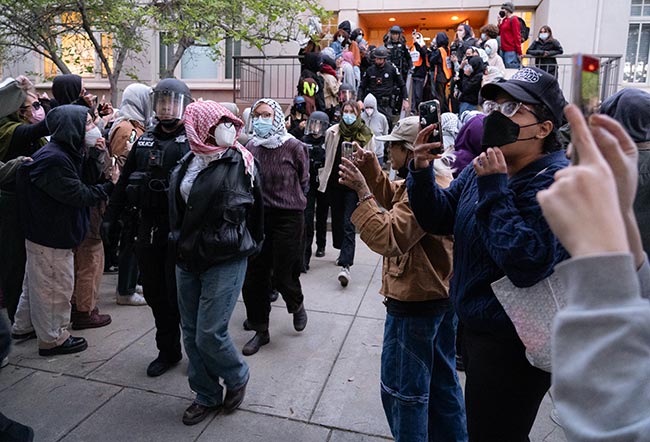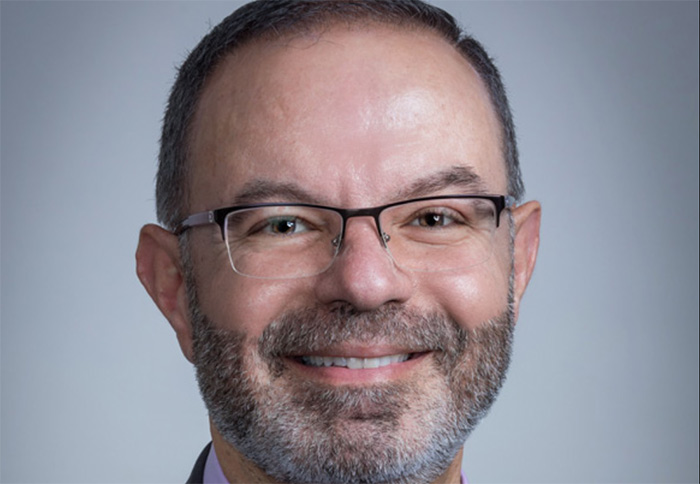Claremont Lincoln speaker discusses religion, overall women’s rights
Protecting women’s rights from the fundamentalist forces that would curtail them needs to be a collective effort, according to Masum Momaya, a Smithsonian curator and social justice activist who will speak next weekend at the annual Jain Conference on the State of Women in Religion Around the World. Themed “Women’s Perspectives in the Dharma Traditions (and beyond),” the conference is hosted by Claremont Lincoln University.
During her talk, “Resisting with Image and Word: Women Challenging Fundamentalism,” Ms. Momaya will address gender inequities stemming from fundamentalist interpretations of Christianity, Hinduism and Islam.
“Islam is the religion that most often gets demonized, but there are bad apples within any religious context,” Ms. Momaya said. “That’s why I’m using examples from Hinduism and Christianity, too.”
The first step to addressing the problem is to clarify what fundamentalism is, she insists.
“In most cases, it’s a very particular interpretation of religious scripture and text that sees women through a patriarchal lens,” Ms. Momaya said. “With it, you’ll often see restrictions on women’s mobility, and violence as a means of demonstrating intolerance.”
Such is the case in Afghanistan where, for many years, countless girls have been prevented from going to school. Sometimes, their educational disenfranchisement stems from families that insist girls don’t need schooling. In many cases, they are kept at home for fear they will fall victim to violent attacks at the hands of extremists.
Malala Yousafzai, a young Pakistani activist who was shot in the head at age 14 by Taliban gunmen and survived, is one of the many women raising their voices on the issue. She continues to advocate for worldwide girls’ education, notably speaking on this topic in a recent UN address that coincided with her 16th birthday.
Such cases of individual rebellion are integral to the fight for equality, Ms. Momaya said: “Without cases of personal courage and bravery, it would be very difficult to stand up.”
Really, though, she feels protecting women’s rights requires a “constellation of factors,” including the support of family, of other women and of the community as well as the meaningful backing of the law.
An issue for all religions
Many consider the oppression of women to be the exclusive domain of Islam, according to Ms. Momaya.
“A lot of people look at Islam and see the veil as a symbol of control,” she said. “In many cases it is, but in many cases it’s more complicated. Just because there isn’t necessarily a parallel corollary in what Christian or Hindu fundamentalism looks like doesn’t mean that forms of control are not in place.”
One case of non-Islamic fundamentalism Ms. Momaya will discuss at the conference is the plight of women in the Indian state of Gujarat. Religious pluralism once reigned in the region but, in the last half-century, it has become a stronghold for those who want to make India a Hindus-only country. Many Muslim women have been submitted to sexual harassment, rape and brutal violence at the hands of Hindu fundamentalists. The government has turned a blind eye to the situation, she noted.
“The idea is that if you rape the women in another particular group, it’s the most egregious offense you can commit,” Ms. Momaya said. “Over time, the violence is compounded, with people saying, ‘Look what you did to us—yet another instance. We need to retaliate.”
In rare cases, fundamentalism turns women’s bodies into battlefields. In many more cases, it encourages women to be viewed as symbols of purity rather than as flesh-and-blood human beings, Ms. Momaya said.
“Women’s roles and rights become very circumscribed, and their behavior becomes closely watched, monitored and restricted,” she said. “If any woman deviates outside of expectations—if she wants a career or wants to explore her sexuality—it becomes inflexible.”
This rigidity can be seen in parts of the United States where fundamentalist Christian movements are the strongest, Ms. Momaya said, emphasizing that fundamentalism has no geographic or religious boundaries.
“The party line of fundamentalists is very similar across religious groups. The form of control may vary but it is always justified by saying ‘We need to uphold these things to keep the integrity of the community.’”
The fact that places where people of many faiths once peacefully coexisted are now wracked with intolerance should give the people of the United States pause, Ms. Momaya said. Post 9/11 America is facing a particularly vulnerable moment in history, she said.
“Pluralism is part of our founding as a country,” she said. “We’re definitely seeing it endangered by scapegoating, specifically of the Islamic community.”
Ms. Momaya, who hails from the Indian tradition of Jainism, known for its non-violence, said Islam is at its roots a religion of peace, but “people are using interpretations of it to justify violence.”
Keeping the faith
Many people feel the best way to avoid fundamentalist oppression is to reject religion altogether but, given that the vast majority of the world’s population follows one form of faith or another, this isn’t a realistic tack, Ms. Momaya said.
A more effective way for women to counter fundamentalism is to embrace movements within their respective traditions that call for a more empowering interpretation of religious text. There are male and female clergy of every faith encouraging equality, justice, non-violence and tolerance across different religious communities, Ms. Momaya said.
“These are not necessarily reinterpretations that are new but interpretations that are alternate to ones that are fundamentalist,” she said.
Reading the news, one could easily conclude that fundamentalism and its concurrent female oppression and violence are winning the day, but Ms. Momaya feels it is important to maintain perspective.
“If you look at any place in the world, there are steps forward and steps back. Those things live side-by-side,” she pointed out.
Ms. Momaya feels the Jain Conference on the State of Women in Religion Around the World is particularly timely, because fundamentalist forces are increasing in strength.
“One of the only ways to be able to counter that is to work within religion traditions and faith-based organizations,” she said. “It’s going to take really marshaling the resources of alternative interpretations and people’s adherence to the good things in their faiths to fight this.”
The Jain Conference on the State of Women in Religion Around the World will be held on Friday, August 23 and Saturday, August 24 from 8:30 a.m. to 9 p.m. in the Mudd Theatre at Claremont Lincoln University, 1325 N. College Ave. in Claremont. Admission is $60, $35 for students and includes 6 Jain meals and a field trip to the Jain Center of California in Buena Park. To register online, visit www.jain.claremontlincoln.org/2013-conference.
—Sarah Torribio
storribio@claremont-courier.com








0 Comments